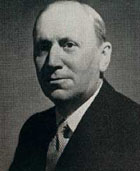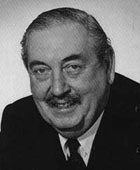
POLITICAL WAFARE EXECUTIVE
On 7th November, 1942, Bracken reaffirmed his views regarding the petrol consumption and further wanted to impose another 50% reduction, by withdrawing from Woburn such persons as were non essential. Accordingly, on 24th. December 1942, Meikle, from August ,1942, the chief administration officer for P.W.E., strongly recommended that Lockhart accept a P.W.E. report on this subject by Brigadier Eric Sachs and so on that date Lockhart duly spent a long day at the office with his administration officer, going over the details. Consequently, by the end of the year most of the staff had been consequently brought back from Woburn to Bush House, excepting that section engaged on secret work.
Leeper, of the opinion that 'the country' gave more time for thinking and planning, bitterly opposed the move but anticipating the outcome he sent a personal and secret letter to Lockhart, saying that he had now decided to go back to the Foreign Office. In view of this, on December 29th, 1942, Lockhart talked to Eden and proposed Leeper as Ambassador to Greece, since he knew he would resign if the new intelligence scheme was adopted. As expected, on 7th, January 1943, Leeper made an appointment with Eden and resigned. He then met Lockhart and drafted a circular for the Woburn personnel, explaining that, in his opinion, his reason for going came as a result of the ministerial decision to move the intelligence centre, so depriving him of a job. Recently knighted, on 4th March, 1943, Lockhart gave a farewell dinner for Leeper, in honour of his appointment as Greek ambassador but in reply Leeper became rather patronising and facetious, no longer having any interest in P.W.E.
Supervising communications
At this period another farewell also had to be said but of rather a more enforced variety on this occasion. On January 20th., 1943, Lockhart had been summoned to Broadway Buildings by 'C', head of the Secret Service, who told him he would take an option on all P.W.E. buildings and staff. Richard Gambier Parry would be kept on an agency basis but for Air Commodore Blandy, wireless adviser, who had been jointly responsible with Gambier Parry for supervising P.W.E. communications, there would be no position. It had been because of the lax security of the German aircrews that a Special Air Intelligence Section, A11 (e), had been created under Air Commodore Lyster Blandy, to intercept and exploit this traffic. Air Commodore Lyster Blandy had originally been seconded to P.W.E. from the R.A.F., whose signals section had been interested in the use of Aspidistra. He was supposed to supervise the technical control and the security of the transmitter but found himself outflanked by Gambier Parry who would not authorise him to visit Aspidistra nor notify him of the test transmissions. Originally it had been due to the insecurities of German aircrew, in their radio conversations, that under Air Commodore Blandy to intercept and exploit this traffic a special Air Intelligence Section, A11(e), had been created.


In the 1942 reorganisations, a three man committee had been set up to investigate the existing P.W.E. structure. They decided in favour of the regionalisation principle, each area to be concentrated under a specific director and he would have responsibility for all the propaganda work relating to that region. The B.B.C. Intelligence Section and the B.B.C. Overseas Research Unit were therefore to be disbanded with suitable people from each transferred to P.W.E. The B.B.C. proved unenthusiastic, however and so - although the regionalisation aspect remained - for B.B.C. needs a Central P.W.E. Intelligence Unit was to be formed in London, staffed mainly by B.B.C. personnel. This arrangement proved somewhat unsatisfactory and the intelligence service then underwent a new enquiry. Amongst the changes, this now strengthened the intelligence staff attached to the Regional Directors and the Central Directorate and confirmed that the majority of the intelligence staff should work in London.
The regions
Seven regional directorates, each producing a weekly report, became the backbone of P.W.E., the most important being Germany and Austria, originally the German Section. A P.W.E. directive of July 1st., 1943, specified the directive thus; 'Our aim is to split the German people, not to do Goebbels job and unify them.' In charge of this, until 1943, was Richard Crossman. The other directorates were France, Italy, Scandinavia, under T.G. Barman, the Low Countries, Balkans, Poland and Czechoslovakia. (Until September, 1943, the same regional P.W.E. director dealt with Poland and Czechoslovakia). At first all the directorates, except for Germany and Austria, which had their own service, relied for intelligence on the Foreign Office but eventually they all acquired the responsibility for their own. Captain Colin Wintle acted as S.O.E.s liaison officer for all the P.W.E./S.O.E. regions, as far as black propaganda was involved, targetted to Germany and the occupied territories.